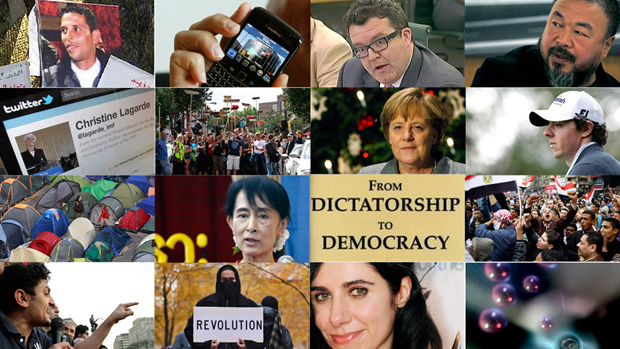Who changed the world in 2011?
We’ve been asking you who changed your world in 2011. With the Arab Spring, the “Occupy” movement and social media dominating – was it the year of crowd power?

Has 2011 been the year of the crowd? From Wall Street to St Paul’s Cathedral, the people have raged at the bankers who caused the global financial crash and the politicians accused of shielding them.
Likewise the student protests, the strikes and the riots punctuate a year of change led by the masses, not our leaders.
The man credited with sparking the Arab Spring is a key figure, because the revolutions his act triggered. Tunisian street vendor Mohamed Bouazizi set himself on fire in protest at the confiscation of his fruit and veg cart. His death became the catalyst for sweeping change in the Middle East in 2011, a tumult still being felt in the region now.
More from Channel 4 News - Snowblog: who changed the world in 2011?
We also want to know what’s changed your view of the world in science, the arts and in technology. Should the iPodfather Steve Jobs, who died this year, be on our list? How about physicist Antonio Ereditato who found Einstein might have been wrong on the small matter of neutrinos and the speed of light?
And what about PJ Harvey, an icon of British music who proved singing about war and death was no bar to scoring a hit album?
We want to hear from you. Who or what changed your world in the last 12 months? Vote in our live poll here.
Your tweets so far
@mtyala: Mohamed Bouazizi definitely changed the world in 2011...future generations owe this young man a debt of gratitude.
MsLupin: Tom Watson and Hugh Grant, for their work exposing Hackgate.
@davegre: Twitter & Blackberry Messenger changed the world.
LEBurgessArt: Occupy movement wins hands down! #c42011
@Jonwrightbahons: Jon Snow has been a great reporter for the people on different topics all year! Legend!
What the experts say
Dr Frederic Volpi, senior lecturer at the University of St Andrews School of International Relations, told Channel 4 News change on the “Arab street” had the biggest impact of the year.
He said: “For each well-known figure of the Arab Spring you do have a massive amount of ordinary citizens that have been taking risks, often with their own lives, to give momentum to this popular protest.
“Why people mobilise in the first instance is not down to a single trigger. It is not the action of somebody setting himself on fire in Tunisia, nor the action of a single activist trying to mobilise a protest on Facebook or Twitter, or people responding to police brutality; it is a combination of all these elements.
I think people are saying, enough is enough, we have created a huge disparity in our societies that needs to be addressed. Farooq Murad
“But I think what is significant is that ordinary people under very harsh auto-totalitarian regimes in the Middle East, realised they had a political power, some political ability to change the way things were. This realisation was crucial.”
Farooq Murad from the Muslim Council of Great Britain added: “The people have led this movement, and we see an expression of that in other parts of the world, for example, the Occupy movement that is going on in western countries, prior to that we had the student protests in this country.
“I think people are saying, enough is enough, we have created a huge disparity in our societies that needs to be addressed.”